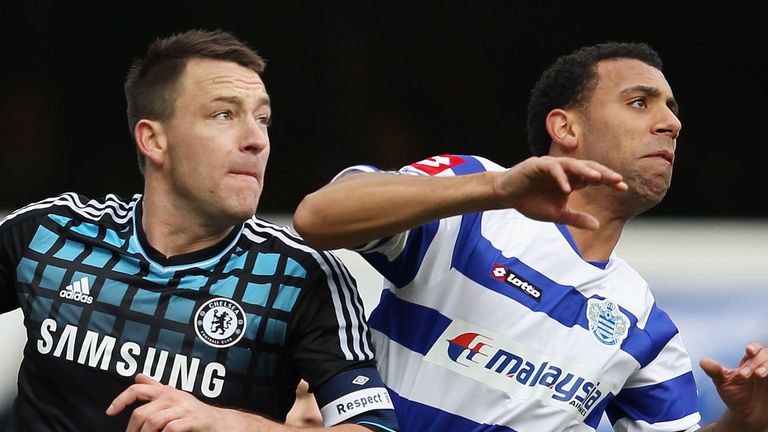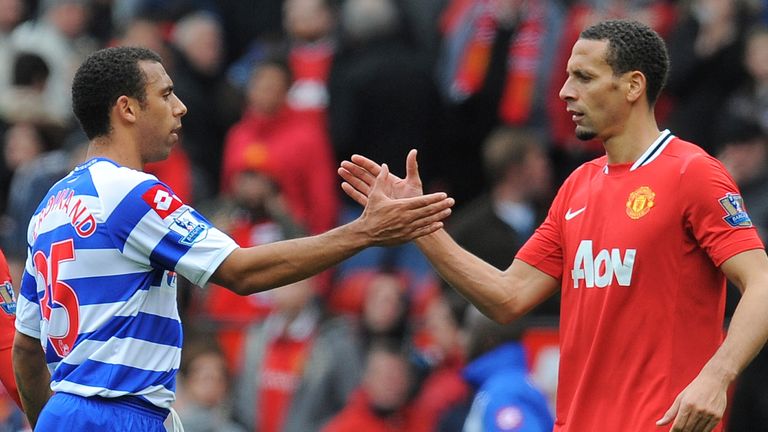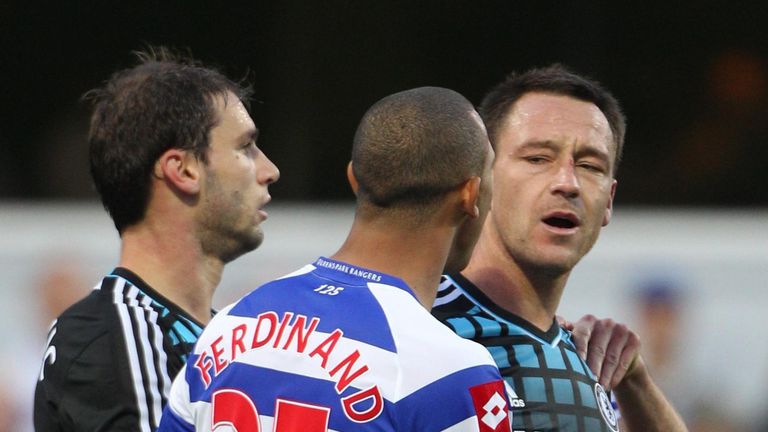Anton Ferdinand reveals guilt at not speaking out during racism case against John Terry
John Terry was accused of using racist language during QPR vs Chelsea Premier League match in October 2011; Anton Ferdinand opens up for first time in documentary; Rio Ferdinand also reveals how 'powerless' he felt supporting his brother; FA denies favouring Terry during case
Tuesday 1 December 2020 11:06, UK
Anton Ferdinand has spoken about the guilt he felt at not speaking out during his high-profile racism case against John Terry.
The former West Ham, QPR and Sunderland defender has opened up about the case for the first time in the BBC documentary Anton Ferdinand: Football, Racism and Me.
Then-Chelsea and England captain Terry was accused of using racist language during a Premier League match between QPR and Chelsea on October 23, 2011.
Although Terry was acquitted in a criminal case related to the incident, after it was judged it could not be proven beyond reasonable doubt the words were spoken as abuse, a Football Association independent disciplinary panel, working to a lower threshold, did find him guilty.
As a result, Terry was then banned for four matches and fined £220,000.
While Ferdinand did not hear the words at the time, the defender was advised not to comment on the incident publicly while also suffering a torrent of racist abuse online - something he regrets not speaking out about at the time.
"I still carry a feeling of letting people down for not speaking up," Anton Ferdinand said. "I still feel guilt and it eats away at me more than anything and I don't know how to get rid of it.
"At the time I was angry more than anything and I knew that because I was angry, if I spoke out about it then I would have become a stereotype of a young black man who fires from the hip and shouts his mouth off."
Kick It Out: Football let Ferdinand down
Sanjay Bhandari, chair of anti-racism charity Kick It Out, said he felt a sadness watching the documentary but confirmed they are hoping to work with Ferdinand to help educate others in the sport.
"The abiding feeling I was left with was one of profound sadness," said Bhandari. "Sadness at the visible and deep impact that the incident had on Anton and his family. And sadness that, as a game, collectively, we let him down. I hope that the process of creating the documentary helps Anton to reach closure on this painful episode in his life.
"I was heartened to see his interviews indicating that he wished to use his experience positively to help the football family, including Kick It Out, to learn from this experience. If the offer stands, we would love to take him up on that and listen to his views. We need to ensure that, collectively, football learns the lessons from this.
"I know that much progress has been made by the FA and others in the years since this investigation but we also know that there is still more to do. A key focus should be that, across all areas of the game, such processes should be more clearly victim-led.
"A higher focus should be placed on ensuring that players and participants from the Premier League to grassroots receive appropriate welfare support from the moment a complaint is made.
"Ultimately, this was a programme that reminds us that discrimination and hate are not just headlines. They have a lasting impact on human lives. Our collective focus as a football industry should be on how we work together to do better. I thank Anton Ferdinand for his honesty and wish him the very best."
Rio: I felt powerless to Anton's situation
Anton Ferdinand's older brother Rio also took part in the documentary and believes the case had a detrimental effect on his brother's career.
Rio was Terry's England team-mate at the time and also regrets not discussing the case, not only with his brother but publicly as well.
"The incident was probably the catalyst for the downturn of his career," Rio Ferdinand said.
"Who knows how I would have reacted if at every stadium I went to people were making you feel like you were the instigator and aggressor in the situation when you were really the victim.
"Shouting obscenities all the time regarding the case so you can never get away from it.
"I was confused and disappointed with the way it unravelled and we never really spoke about it - I don't know why we never did in depth.
"Everyone was saying, bar a few close friends, family, mum especially and dad, were telling us to say nothing - let the lawyers deal with it and let it go to court and it will be sorted out.
"And I feel guilty because all I kept thinking was - how is this happening to my brother? I should have spoken out but I just felt powerless."
FA denies favouring Terry after Ferdinand documentary
The FA has denied showing favouritism to Terry during the racism investigation.
In the documentary, Anton Ferdinand criticised the FA's handling of the high-profile case, saying he "didn't feel like the victim" when speaking to investigators from the governing body.
However, the FA released a statement immediately after the programme had aired to deny any suggestion its investigation favoured the defender.
English football's governing body said it "believed in the case against Terry" and that it stripped him of the England captaincy before Euro 2012 "early in the process".
A statement read: "Believing in the case against John Terry, they (the FA's regulatory team) worked tirelessly to ensure that the case put before the disciplinary panel was robust, having appropriately recorded and challenged all relevant witness evidence, which ultimately resulted in a successful prosecution before an FA Disciplinary Panel.
"Early in the process, The FA also removed John Terry as England captain due to the seriousness of the allegations. It showed him no favouritism and made clear how serious the allegations were taken."
According to the BBC, Ferdinand tried to contact Terry during the making of the documentary, having not spoken since that day at Loftus Road - although Terry did reportedly try to reach out to Ferdinand in the aftermath.
Terry did not reply to Ferdinand's message, but his representatives did respond to the production team, saying he has moved on with his life and does not want to reopen a case on television that was decided in court.
Sky Sports stands united against Online Hate. For more information visit: www.skysports.com/againstonlinehate
If you see a reply to Sky Sports posts and/or content with an expression of hate on the basis of race, colour, gender, nationality, ethnicity, disability, religion, sexuality, age or class, please copy the URL to the hateful post or screengrab it and email againstonlinehate@skysports.com.





